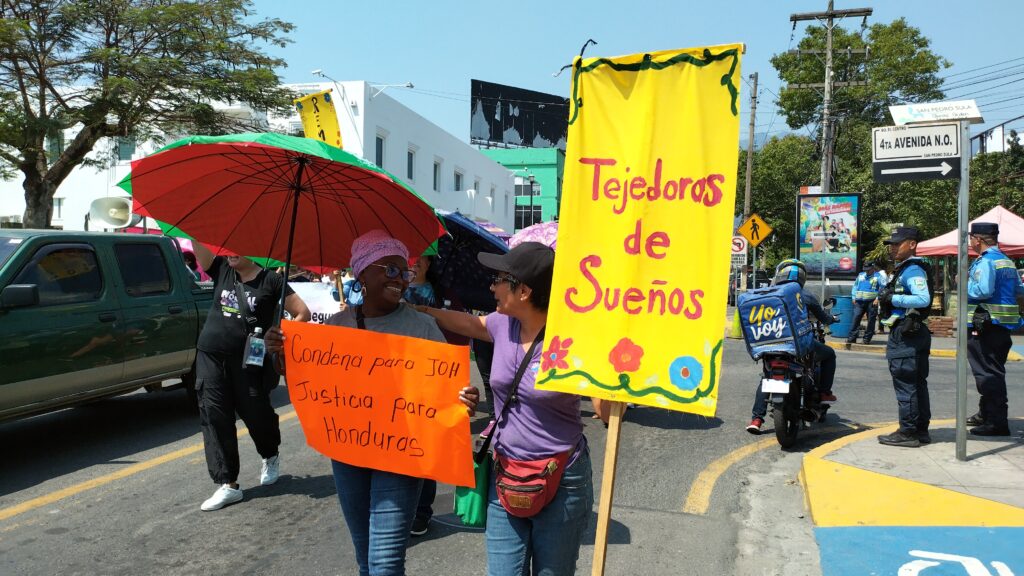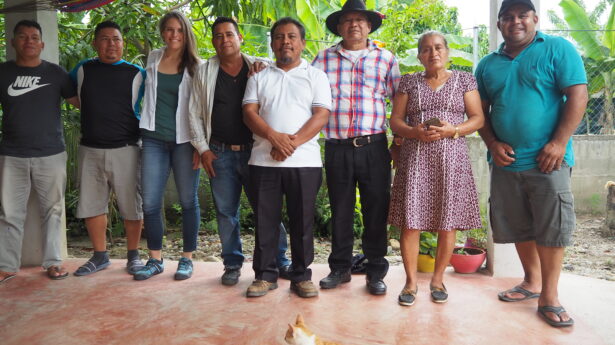The Unitarian Universalist Service Committee advances human rights through grassroots collaborations.
Latinx Communities Advance Human Rights

By Josh Leach on October 11, 2024
For more than a decade, our partners throughout the Americas have been putting themselves on the line to defend human rights and the integrity of the planet. They continue this work despite intimidation, violence, and nonstop vilification from powerful actors who want to suppress their courageous advocacy.
In the face of this violence—including increasingly vocal anti-Hispanic bigotry from far-right politicians in the U.S.—it’s time to cut through the noise and extend our partners the overdue recognition they deserve. As the country marks Hispanic Heritage Month (September 15-October 15), we lift up and honor the contributions of our Spanish-speaking partners to improving life for us all.
Strengthening the Right to Safety in Central America
UUSC’s Spanish-speaking partners in Central America are working to address the forces that make it unsafe for people to stay at home: including food insecurity and gender-based violence. In Nicaragua, the Fundacion Entre Mujeres (FEM) empowers women to feed their own families and communities in a sustainable way. Led by and for women, FEM helps make food sovereignty a reality, ensuring communities can protect themselves from the threat of hunger, even in the face of climate change and their country’s ongoing political crisis.

In Honduras, our longstanding partner at Foro de Mujeres por la Vida is working to stop one of the worst human rights crises in the region: the epidemic of violence against women. Widespread femicide—the killing of women on the basis of gender—is often met with impunity. An estimated 90% of murders and disappearances of women in Honduras are never solved. Foro responds by operating one of the few (if not the only) observatories in the region that monitors this crisis and draws attention to the need for justice.
This courageous work often puts human rights defenders at risk. Nowhere is this so starkly illustrated as in the case of our other Honduran partner, Fundación San Alonso Rodríguez. For their work to defend the environment from illegal mining, they have faced threats, wrongful imprisonment, harassment, and murder. Their bravery in the face of this persecution inspires UUSC to join their struggle for stronger protections for human rights defenders throughout the Americas.
Supporting People in Migration Across Borders
People in migration are exposed to danger throughout the Americas. People who have previously been expelled from the United States often face extortion and discrimination in their home communities. Those who travel through Mexico may be similarly targeted. Our partners throughout the region are working to counteract this injustice and ensure safety on the migration trail.
Our partner the Albergue y Comedor para Migrantes San Francisco, A.C., for instance, provides food, shelter, and psychosocial support to people migrating through Sinaloa, Mexico. Tochán Sueños y Realidades, A.C. and the Scalabrinianas Misión con Migrantes y Refugiados similarly offer support and accompaniment to people in migration in Mexico City. And FM4 Paso Libre works to ensure the safety of people traveling in Guadalajara. Between them, these shelters reinforce the security of people journeying through Mexico, whether by the central or the Pacific land routes.
Even as these shelters provide direct services to people in migration, some of our Mexican partners are also working through the legal system to guarantee justice for missing people and to halt the scourge of anti-immigrant violence at its source. Fundación Para la Justicia y El Estado Democrático de Derecho (FJEDD), for instance, based in Mexico City, accompanies the families of people who have disappeared on the migration trail as they seek answers and accountability for these crimes.

Meanwhile, in Guatemala, the Asociación Pop No´j (APN) serves people who are living through a different aspect of the migration experience—specifically, Maya Indigenous youth who have previously been deported from the United States. Many of these young people struggle to find support and a new life in Guatemala after their expulsion. They may even have left the country when they were so young that they have no memory of Guatemala. APN helps them reintegrate in their communities nonetheless by finding economic opportunities, starting their own organic farms, and otherwise reestablishing the core essentials of “good living”/buen vivir.
Defending the Right to Migrate in the United States:
All people deserve the ability to live safely at home—but, when home is no longer safe, they equally should have the right to find refuge across borders. UUSC and our partners are working to secure this right as well throughout our shared region.

The Alianza Nacional TPS/National TPS Alliance, for instance, endeavors to secure a path to citizenship for people from Temporary Protected Status–designated countries (that is, places the U.S. government has determined to be unsafe for return due to ongoing humanitarian disasters). The Alliance therefore includes nationalities from outside Latin America (including Caribbean, African, and Asian countries with TPS). But many of the constituents they represent are also Spanish-speaking and/or Latinx.
TPS holders escaped humanitarian crises and have built homes and lives in the United States (in some cases for decades). They have contributed billions of dollars to the U.S. economy through working and paying taxes with legal permission. Yet, despite their deep ties to our shared communities—and the manifest benefits they have delivered to this country—the U.S. government still denies them any means to attain permanent status. The TPS Alliance seeks to change this by securing a long-overdue path to citizenship.
At a time when far-right politicians are trying to stoke xenophobia and vilify Spanish-speaking people in this country, our Latinx partners throughout the Americas unmask the lie behind these stereotypes. Powerful actors may try to profit off of dividing people by borders, language, ethnicity, and nationality—but that will not stop our partners from insisting on our shared rights as human beings.
You can help join in solidarity with our partners’ struggle by signing up for our email list here. You can also donate to support our work on this page. A contribution in any amount helps us ensure our partners can sustainably defend human rights for decades to come.
Image credit: UUSC

